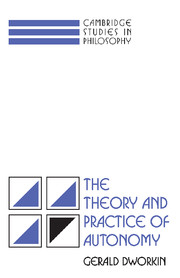Summary
I am well aware that these essays represent the middle of a research program rather than its completion. In the past few years a number of books have been published that have made significant contributions to this effort. I shall outline some of the problems and issues that require continued investigation.
There are a number of conceptual issues that must be worked out in greater detail. Perhaps the most crucial is gaining a better understanding of the difference between what I call “procedurally independent” second-order evaluations and those that are not. Roughly, the distinction is between those modes of evaluation that interfere with the rationality of higher-order reflection and those that do not. We believe, prior to philosophical reflection, that there is a difference between a person who is influenced by hypnotic suggestion or various modes of deception and those who are influenced by true information and modes of rational inquiry. In the former case, but not the latter, we think of someone else as responsible for his reasoning and his conclusions. This is not a metaphysical distinction but a practical one and it is important to make explicit what criteria we use to make such a distinction.
It would also be useful to work out the connections between a clearly defined notion of autonomy and other notions such as rationality, being free, self-knowledge, ambivalence, neurosis, weakness of the will, and so forth.
- Type
- Chapter
- Information
- The Theory and Practice of Autonomy , pp. 161 - 166Publisher: Cambridge University PressPrint publication year: 1988

